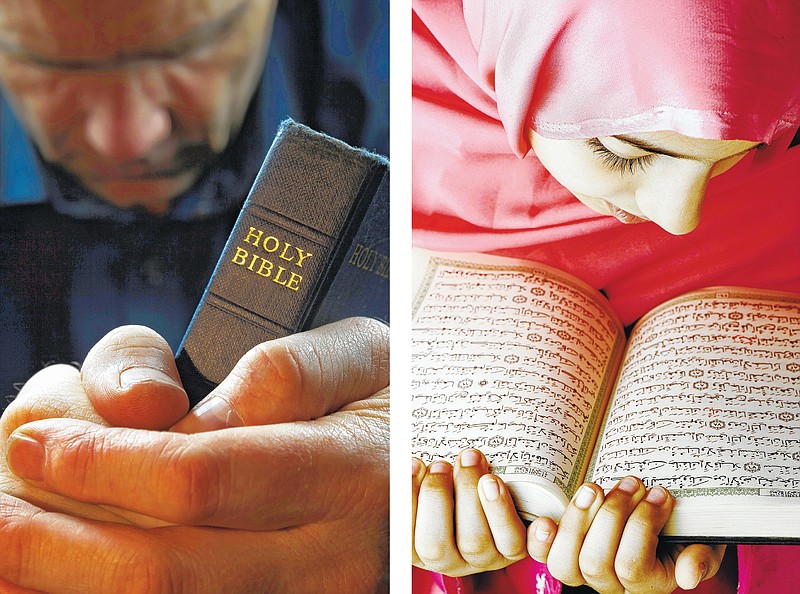About Shabir Ally
Wood: Holy Books of Peace?Scholars will debate whether Bible, Quran are books of peaceDr. Shabir Ally is the president of the Islamic Information & Dawah Centre International in Toronto, Canada.A Muslim activist, academic, scholar and public speaker on Islam and comparative religion, he is viewed as the leading Muslim debater in the world on Islam and Christianity, having engaged in public debates around the world with noted theologians, Christian apologists and renowned philosophers.He has a master’s degree and doctorate degree in Islamic studies from the University of Toronto, and a bachelor’s in religious studies from Laurentian University with a specialization in biblical literature.He is the author of numerous booklets on Islam and Christianity.
IF YOU GO
Who: Dr. David Wood, well-known Christian apologetic and scholard, and Dr. Shabir Ally, a well-known Muslim apologetic and scholarWhat: Debates about the Bible and QuranWhen: Monday from 6:30-9 p.m.: “Is the Quran a book of peace?” and Tuesday from 6:30-9 p.m.: “Is the Bible a book of peace?”Where: UTC Derthick Hall, next to the new libraryWebsite: www.WoodAllyDebateChattanooga.comModerator: Chattanooga Times Free Press Business Editor Dave Flessner
This week, my Christian friend David Wood and I will each argue that our sacred scriptures are peaceful; and we will face difficult questions about parts of the Quran and the Bible which do not seem peaceful at first glance.
The matter of peace and violence is supremely relevant to Americans and Canadians now, while our governments pursue peaceful solutions to conflicts abroad, and while they contemplate the possible use of violence for the sake of ensuring peace, justice, and freedom - whether at home or abroad.
The matter is also of crucial importance for Muslims in general, because in recent times some Muslims who seem to (and sometimes claim to) represent Islam have committed a number of inexcusably violent acts. While the majority moderate Muslims decry the violence and governments enact measures to curb the killings, it is crucial for moderate Muslims to deconstruct the theological arguments which violent groups use in recruiting impressionable youth.
In my own work on this, I have found that those who appeal to the Quran in support of their wanton violence also do violence to the Quran in typical cut and paste proof-texting fashion. However, the Quran's verses have to be read in two contexts: the context of the Quran as a whole; and the context of the geo-political circumstances which the Quran was first preached. Thus read contextually, the Quran emerges as insisting on peace and placing limitations on war.
War can only be waged by a proper authority, for a just cause, with the right intention, as a last resort, and when there is a reasonable hope of success. These essential principles of just war theory, as developed by Christian and western thinkers, were also deemed essential in the Quran. The Quran also upholds the principles of proportion, right conduct in battle and non-combatant immunity. Moreover, in the aftermath of war the Quran prescribes fair resolutions, truth and reconciliation. In sum, the Quran stands for peace, and (if war becomes necessary) for justice before, during and after war.
Therefore, when Muslim groups and individuals inflict violence on civilians, the Quran is not the ground on which they stand despite their twisted citations. They often rely on hadiths, reports about sayings and actions of the prophet Muhammad. Though generally helpful in elaborating the Quran's brief statements, however, not all hadiths are authentic. In any case, hadiths cannot be used to cancel the Quran's vision of peace. Extremists also rely on violent interpretations which naturally formed during the expansionary phase of the Muslim empire after the prophet's demise. Such interpretations were intensified by the onslaught against Muslims by crusaders and others. Failing to see this bigger picture, Muslim extremists imagine that all these interpretations go back to the Quran. We need to show them the Quran's vision of peace beneath the violent interpretations clouding it.
What often spurs some young Muslims to seek such violent interpretations is the search for a glorious Muslim identity that seems hopeless in the face of colonialism, despotic rulers and their western allies. Muslims in general crave justice for the Palestinian people in particular. Some of the youth hope that returning to a puritanical society ruled by God's law would ensure justice for all - Muslims and non-Muslims alike, just as things were in the good old days. Seeing that this too would not happen soon, given the normal course of events, extremists desperately resort to violence backed by misinterpretations of Islam.
Every reasonable and legal measure must be applied to curb such violence. The moderate majority Muslims and others should work hand in hand to battle this modern menace.
In my view, an important part of that battle is for me and other Muslims to study the Quran carefully and show violent extremists that the Quran insists on peace; and that Muslims ruin their afterlife when they wantonly kill themselves and others in violation of the Quran's just-war principles.
Of course my friend David and others at the debates this week will challenge my peaceful interpretation of the Quran. And I will get my questions about the Bible answered. Let's pray that peace wins in the end.
